A Critical Analysis of Socio-Cultural Legacies: London 2012 Olympics
VerifiedAdded on 2021/04/24
|10
|3637
|35
Report
AI Summary
This report provides a critical analysis of the socio-cultural impact of the London 2012 Olympic Games. It begins with an overview of key terms and concepts, including the Olympic Games, stakeholders, and sporting legacy, and then delves into the historical context, including the introduction of ISO20121. The report identifies key issues associated with major sports events, such as high costs, infrastructure challenges, human rights infringements, and security concerns, with specific examples from the London Games. It also identifies key stakeholders, including the British Olympic Association and various governmental bodies. The report discusses the potential positive and negative legacies, both tangible and intangible, and their significance in the planning, delivery, and post-event periods. It examines how these issues impact the sustainability of major sports events and concludes with recommendations on how to handle problematic issues to produce the best outcomes for stakeholders. The report emphasizes the importance of considering the socio-cultural impact of such events to ensure their long-term sustainability and positive influence.

Running head: LONDON 2012 OLYMPICS
Critically Analyzing the Impact of Socio-Cultural Legacies on Major Sports Events
[London 2012 Olympics]
Name of the student:
Name of the university:
Author note:
Critically Analyzing the Impact of Socio-Cultural Legacies on Major Sports Events
[London 2012 Olympics]
Name of the student:
Name of the university:
Author note:
Paraphrase This Document
Need a fresh take? Get an instant paraphrase of this document with our AI Paraphraser
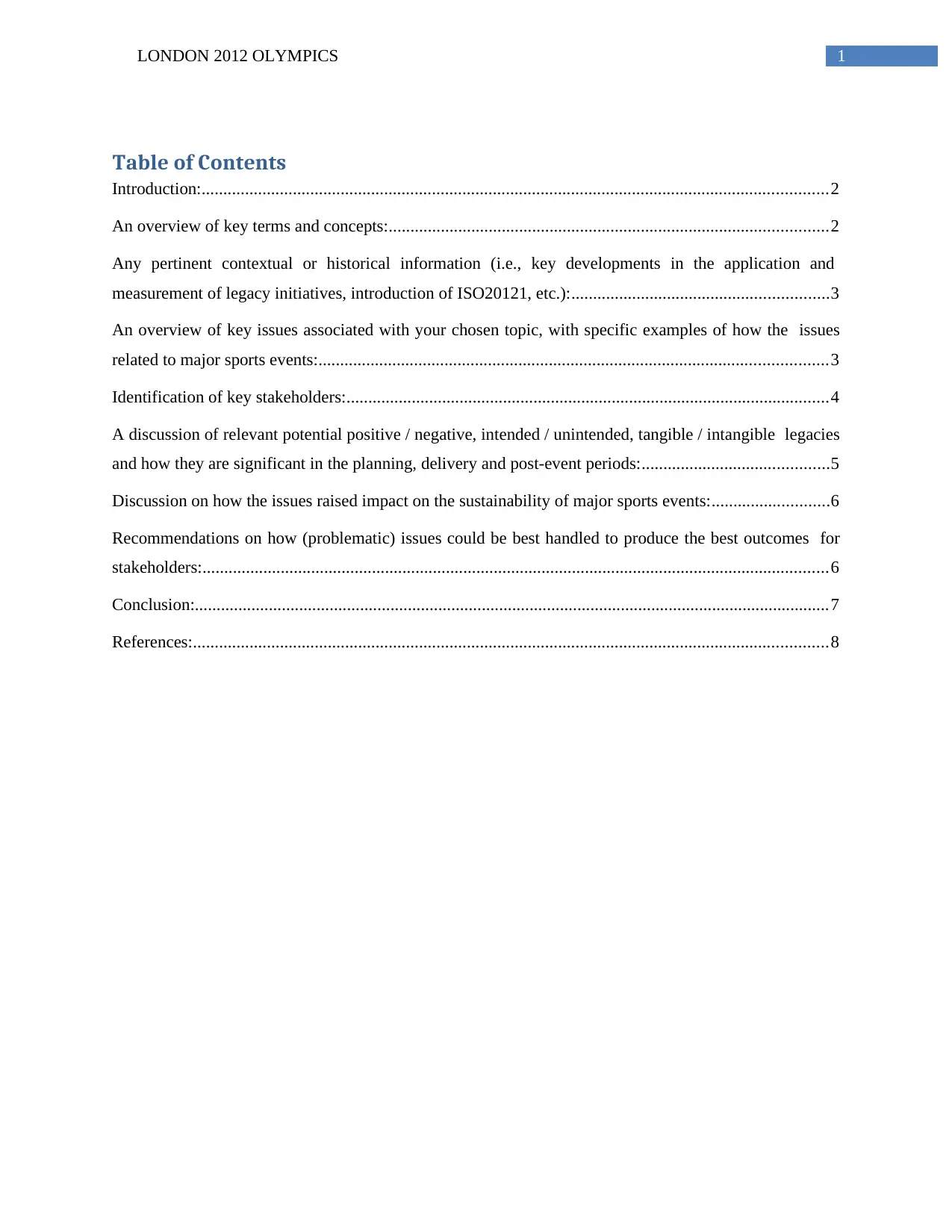
1LONDON 2012 OLYMPICS
Table of Contents
Introduction:................................................................................................................................................2
An overview of key terms and concepts:.....................................................................................................2
Any pertinent contextual or historical information (i.e., key developments in the application and
measurement of legacy initiatives, introduction of ISO20121, etc.):...........................................................3
An overview of key issues associated with your chosen topic, with specific examples of how the issues
related to major sports events:.....................................................................................................................3
Identification of key stakeholders:...............................................................................................................4
A discussion of relevant potential positive / negative, intended / unintended, tangible / intangible legacies
and how they are significant in the planning, delivery and post-event periods:...........................................5
Discussion on how the issues raised impact on the sustainability of major sports events:...........................6
Recommendations on how (problematic) issues could be best handled to produce the best outcomes for
stakeholders:................................................................................................................................................6
Conclusion:..................................................................................................................................................7
References:..................................................................................................................................................8
Table of Contents
Introduction:................................................................................................................................................2
An overview of key terms and concepts:.....................................................................................................2
Any pertinent contextual or historical information (i.e., key developments in the application and
measurement of legacy initiatives, introduction of ISO20121, etc.):...........................................................3
An overview of key issues associated with your chosen topic, with specific examples of how the issues
related to major sports events:.....................................................................................................................3
Identification of key stakeholders:...............................................................................................................4
A discussion of relevant potential positive / negative, intended / unintended, tangible / intangible legacies
and how they are significant in the planning, delivery and post-event periods:...........................................5
Discussion on how the issues raised impact on the sustainability of major sports events:...........................6
Recommendations on how (problematic) issues could be best handled to produce the best outcomes for
stakeholders:................................................................................................................................................6
Conclusion:..................................................................................................................................................7
References:..................................................................................................................................................8
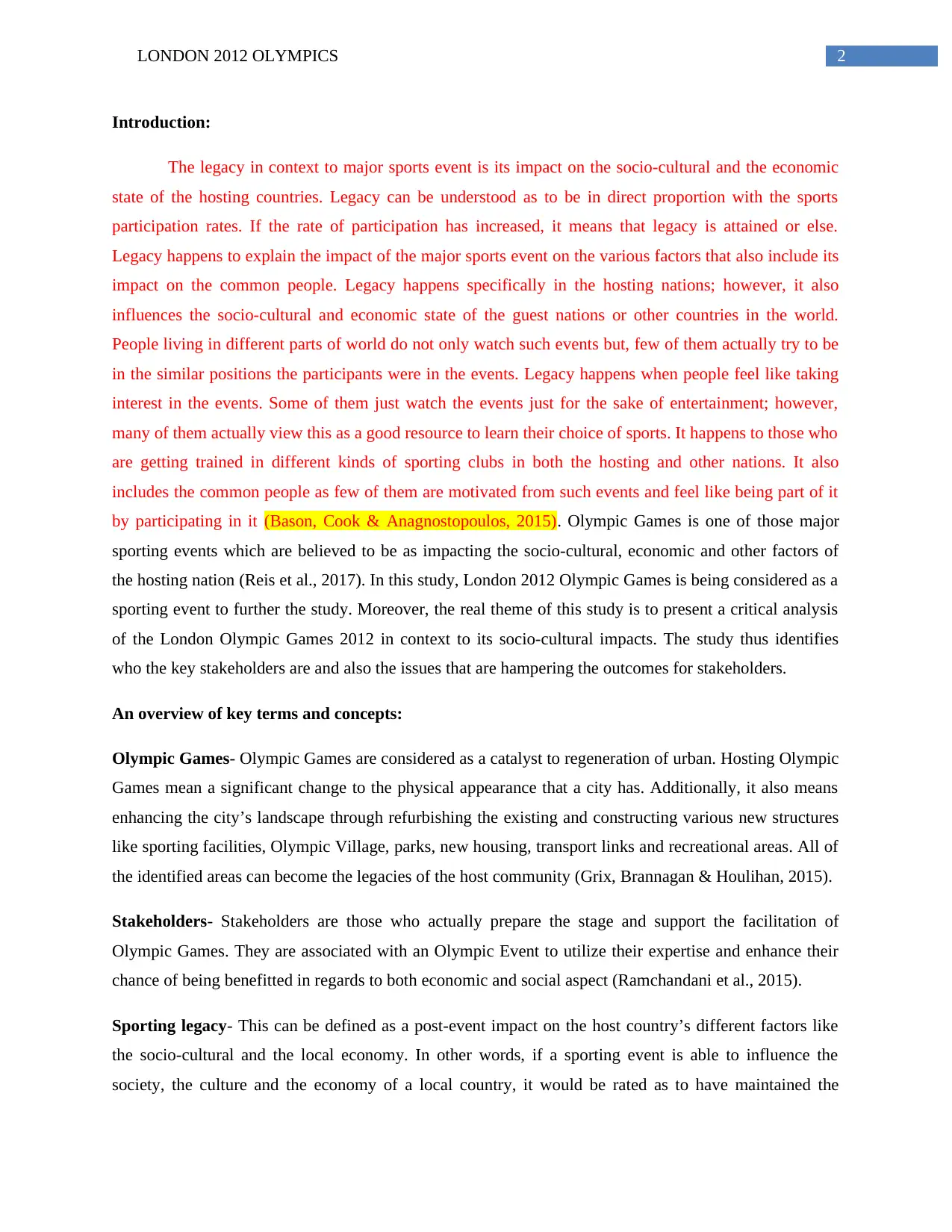
2LONDON 2012 OLYMPICS
Introduction:
The legacy in context to major sports event is its impact on the socio-cultural and the economic
state of the hosting countries. Legacy can be understood as to be in direct proportion with the sports
participation rates. If the rate of participation has increased, it means that legacy is attained or else.
Legacy happens to explain the impact of the major sports event on the various factors that also include its
impact on the common people. Legacy happens specifically in the hosting nations; however, it also
influences the socio-cultural and economic state of the guest nations or other countries in the world.
People living in different parts of world do not only watch such events but, few of them actually try to be
in the similar positions the participants were in the events. Legacy happens when people feel like taking
interest in the events. Some of them just watch the events just for the sake of entertainment; however,
many of them actually view this as a good resource to learn their choice of sports. It happens to those who
are getting trained in different kinds of sporting clubs in both the hosting and other nations. It also
includes the common people as few of them are motivated from such events and feel like being part of it
by participating in it (Bason, Cook & Anagnostopoulos, 2015). Olympic Games is one of those major
sporting events which are believed to be as impacting the socio-cultural, economic and other factors of
the hosting nation (Reis et al., 2017). In this study, London 2012 Olympic Games is being considered as a
sporting event to further the study. Moreover, the real theme of this study is to present a critical analysis
of the London Olympic Games 2012 in context to its socio-cultural impacts. The study thus identifies
who the key stakeholders are and also the issues that are hampering the outcomes for stakeholders.
An overview of key terms and concepts:
Olympic Games- Olympic Games are considered as a catalyst to regeneration of urban. Hosting Olympic
Games mean a significant change to the physical appearance that a city has. Additionally, it also means
enhancing the city’s landscape through refurbishing the existing and constructing various new structures
like sporting facilities, Olympic Village, parks, new housing, transport links and recreational areas. All of
the identified areas can become the legacies of the host community (Grix, Brannagan & Houlihan, 2015).
Stakeholders- Stakeholders are those who actually prepare the stage and support the facilitation of
Olympic Games. They are associated with an Olympic Event to utilize their expertise and enhance their
chance of being benefitted in regards to both economic and social aspect (Ramchandani et al., 2015).
Sporting legacy- This can be defined as a post-event impact on the host country’s different factors like
the socio-cultural and the local economy. In other words, if a sporting event is able to influence the
society, the culture and the economy of a local country, it would be rated as to have maintained the
Introduction:
The legacy in context to major sports event is its impact on the socio-cultural and the economic
state of the hosting countries. Legacy can be understood as to be in direct proportion with the sports
participation rates. If the rate of participation has increased, it means that legacy is attained or else.
Legacy happens to explain the impact of the major sports event on the various factors that also include its
impact on the common people. Legacy happens specifically in the hosting nations; however, it also
influences the socio-cultural and economic state of the guest nations or other countries in the world.
People living in different parts of world do not only watch such events but, few of them actually try to be
in the similar positions the participants were in the events. Legacy happens when people feel like taking
interest in the events. Some of them just watch the events just for the sake of entertainment; however,
many of them actually view this as a good resource to learn their choice of sports. It happens to those who
are getting trained in different kinds of sporting clubs in both the hosting and other nations. It also
includes the common people as few of them are motivated from such events and feel like being part of it
by participating in it (Bason, Cook & Anagnostopoulos, 2015). Olympic Games is one of those major
sporting events which are believed to be as impacting the socio-cultural, economic and other factors of
the hosting nation (Reis et al., 2017). In this study, London 2012 Olympic Games is being considered as a
sporting event to further the study. Moreover, the real theme of this study is to present a critical analysis
of the London Olympic Games 2012 in context to its socio-cultural impacts. The study thus identifies
who the key stakeholders are and also the issues that are hampering the outcomes for stakeholders.
An overview of key terms and concepts:
Olympic Games- Olympic Games are considered as a catalyst to regeneration of urban. Hosting Olympic
Games mean a significant change to the physical appearance that a city has. Additionally, it also means
enhancing the city’s landscape through refurbishing the existing and constructing various new structures
like sporting facilities, Olympic Village, parks, new housing, transport links and recreational areas. All of
the identified areas can become the legacies of the host community (Grix, Brannagan & Houlihan, 2015).
Stakeholders- Stakeholders are those who actually prepare the stage and support the facilitation of
Olympic Games. They are associated with an Olympic Event to utilize their expertise and enhance their
chance of being benefitted in regards to both economic and social aspect (Ramchandani et al., 2015).
Sporting legacy- This can be defined as a post-event impact on the host country’s different factors like
the socio-cultural and the local economy. In other words, if a sporting event is able to influence the
society, the culture and the economy of a local country, it would be rated as to have maintained the
⊘ This is a preview!⊘
Do you want full access?
Subscribe today to unlock all pages.

Trusted by 1+ million students worldwide
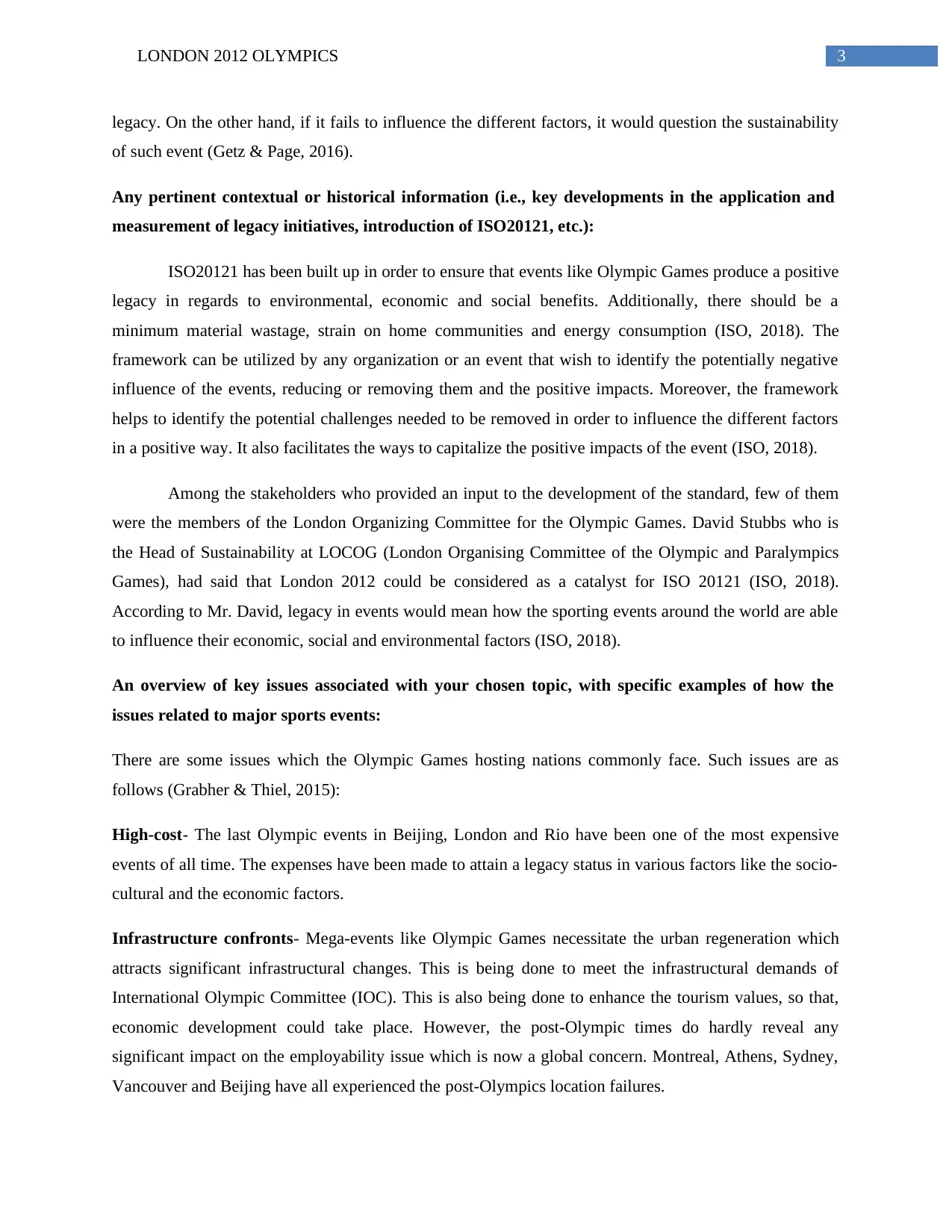
3LONDON 2012 OLYMPICS
legacy. On the other hand, if it fails to influence the different factors, it would question the sustainability
of such event (Getz & Page, 2016).
Any pertinent contextual or historical information (i.e., key developments in the application and
measurement of legacy initiatives, introduction of ISO20121, etc.):
ISO20121 has been built up in order to ensure that events like Olympic Games produce a positive
legacy in regards to environmental, economic and social benefits. Additionally, there should be a
minimum material wastage, strain on home communities and energy consumption (ISO, 2018). The
framework can be utilized by any organization or an event that wish to identify the potentially negative
influence of the events, reducing or removing them and the positive impacts. Moreover, the framework
helps to identify the potential challenges needed to be removed in order to influence the different factors
in a positive way. It also facilitates the ways to capitalize the positive impacts of the event (ISO, 2018).
Among the stakeholders who provided an input to the development of the standard, few of them
were the members of the London Organizing Committee for the Olympic Games. David Stubbs who is
the Head of Sustainability at LOCOG (London Organising Committee of the Olympic and Paralympics
Games), had said that London 2012 could be considered as a catalyst for ISO 20121 (ISO, 2018).
According to Mr. David, legacy in events would mean how the sporting events around the world are able
to influence their economic, social and environmental factors (ISO, 2018).
An overview of key issues associated with your chosen topic, with specific examples of how the
issues related to major sports events:
There are some issues which the Olympic Games hosting nations commonly face. Such issues are as
follows (Grabher & Thiel, 2015):
High-cost- The last Olympic events in Beijing, London and Rio have been one of the most expensive
events of all time. The expenses have been made to attain a legacy status in various factors like the socio-
cultural and the economic factors.
Infrastructure confronts- Mega-events like Olympic Games necessitate the urban regeneration which
attracts significant infrastructural changes. This is being done to meet the infrastructural demands of
International Olympic Committee (IOC). This is also being done to enhance the tourism values, so that,
economic development could take place. However, the post-Olympic times do hardly reveal any
significant impact on the employability issue which is now a global concern. Montreal, Athens, Sydney,
Vancouver and Beijing have all experienced the post-Olympics location failures.
legacy. On the other hand, if it fails to influence the different factors, it would question the sustainability
of such event (Getz & Page, 2016).
Any pertinent contextual or historical information (i.e., key developments in the application and
measurement of legacy initiatives, introduction of ISO20121, etc.):
ISO20121 has been built up in order to ensure that events like Olympic Games produce a positive
legacy in regards to environmental, economic and social benefits. Additionally, there should be a
minimum material wastage, strain on home communities and energy consumption (ISO, 2018). The
framework can be utilized by any organization or an event that wish to identify the potentially negative
influence of the events, reducing or removing them and the positive impacts. Moreover, the framework
helps to identify the potential challenges needed to be removed in order to influence the different factors
in a positive way. It also facilitates the ways to capitalize the positive impacts of the event (ISO, 2018).
Among the stakeholders who provided an input to the development of the standard, few of them
were the members of the London Organizing Committee for the Olympic Games. David Stubbs who is
the Head of Sustainability at LOCOG (London Organising Committee of the Olympic and Paralympics
Games), had said that London 2012 could be considered as a catalyst for ISO 20121 (ISO, 2018).
According to Mr. David, legacy in events would mean how the sporting events around the world are able
to influence their economic, social and environmental factors (ISO, 2018).
An overview of key issues associated with your chosen topic, with specific examples of how the
issues related to major sports events:
There are some issues which the Olympic Games hosting nations commonly face. Such issues are as
follows (Grabher & Thiel, 2015):
High-cost- The last Olympic events in Beijing, London and Rio have been one of the most expensive
events of all time. The expenses have been made to attain a legacy status in various factors like the socio-
cultural and the economic factors.
Infrastructure confronts- Mega-events like Olympic Games necessitate the urban regeneration which
attracts significant infrastructural changes. This is being done to meet the infrastructural demands of
International Olympic Committee (IOC). This is also being done to enhance the tourism values, so that,
economic development could take place. However, the post-Olympic times do hardly reveal any
significant impact on the employability issue which is now a global concern. Montreal, Athens, Sydney,
Vancouver and Beijing have all experienced the post-Olympics location failures.
Paraphrase This Document
Need a fresh take? Get an instant paraphrase of this document with our AI Paraphraser
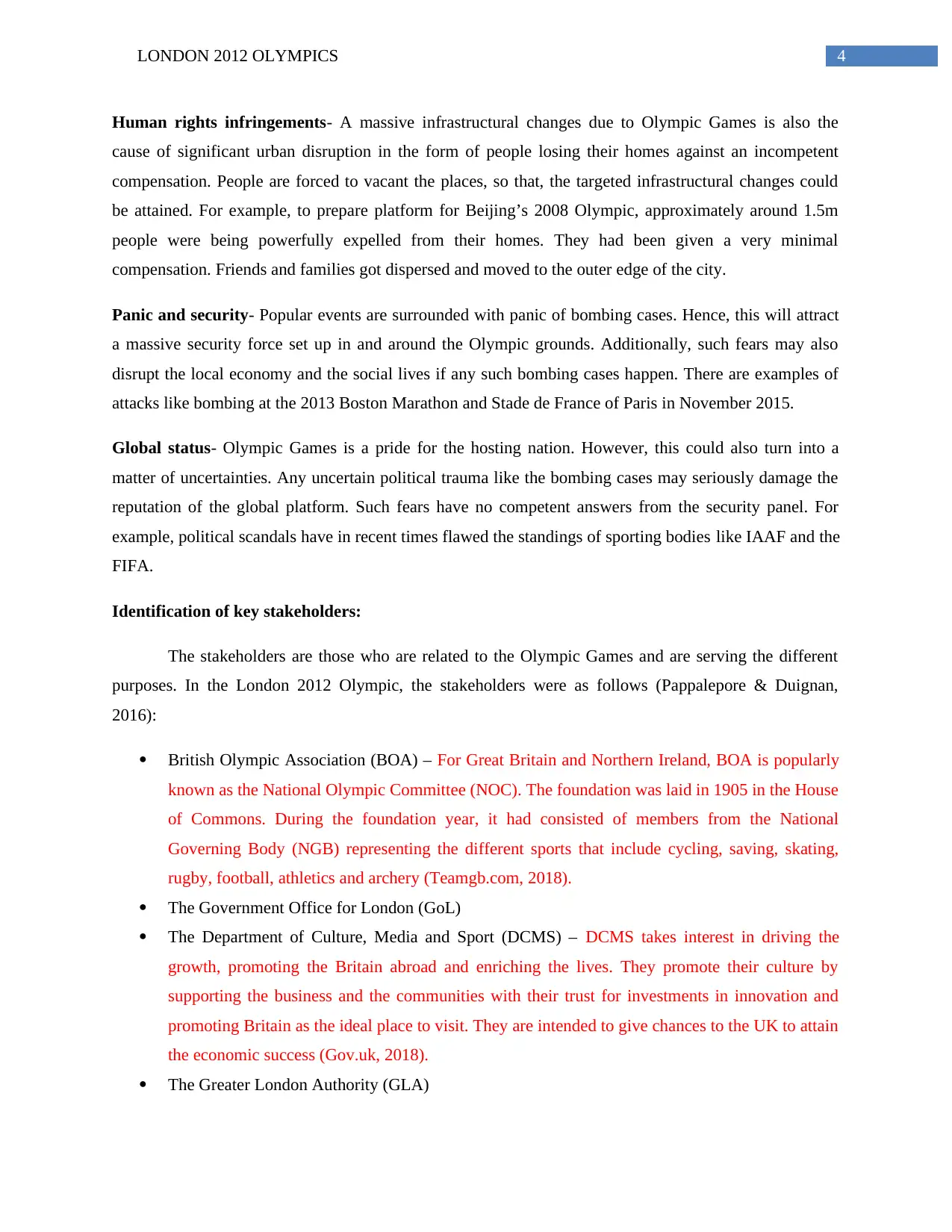
4LONDON 2012 OLYMPICS
Human rights infringements- A massive infrastructural changes due to Olympic Games is also the
cause of significant urban disruption in the form of people losing their homes against an incompetent
compensation. People are forced to vacant the places, so that, the targeted infrastructural changes could
be attained. For example, to prepare platform for Beijing’s 2008 Olympic, approximately around 1.5m
people were being powerfully expelled from their homes. They had been given a very minimal
compensation. Friends and families got dispersed and moved to the outer edge of the city.
Panic and security- Popular events are surrounded with panic of bombing cases. Hence, this will attract
a massive security force set up in and around the Olympic grounds. Additionally, such fears may also
disrupt the local economy and the social lives if any such bombing cases happen. There are examples of
attacks like bombing at the 2013 Boston Marathon and Stade de France of Paris in November 2015.
Global status- Olympic Games is a pride for the hosting nation. However, this could also turn into a
matter of uncertainties. Any uncertain political trauma like the bombing cases may seriously damage the
reputation of the global platform. Such fears have no competent answers from the security panel. For
example, political scandals have in recent times flawed the standings of sporting bodies like IAAF and the
FIFA.
Identification of key stakeholders:
The stakeholders are those who are related to the Olympic Games and are serving the different
purposes. In the London 2012 Olympic, the stakeholders were as follows (Pappalepore & Duignan,
2016):
British Olympic Association (BOA) – For Great Britain and Northern Ireland, BOA is popularly
known as the National Olympic Committee (NOC). The foundation was laid in 1905 in the House
of Commons. During the foundation year, it had consisted of members from the National
Governing Body (NGB) representing the different sports that include cycling, saving, skating,
rugby, football, athletics and archery (Teamgb.com, 2018).
The Government Office for London (GoL)
The Department of Culture, Media and Sport (DCMS) – DCMS takes interest in driving the
growth, promoting the Britain abroad and enriching the lives. They promote their culture by
supporting the business and the communities with their trust for investments in innovation and
promoting Britain as the ideal place to visit. They are intended to give chances to the UK to attain
the economic success (Gov.uk, 2018).
The Greater London Authority (GLA)
Human rights infringements- A massive infrastructural changes due to Olympic Games is also the
cause of significant urban disruption in the form of people losing their homes against an incompetent
compensation. People are forced to vacant the places, so that, the targeted infrastructural changes could
be attained. For example, to prepare platform for Beijing’s 2008 Olympic, approximately around 1.5m
people were being powerfully expelled from their homes. They had been given a very minimal
compensation. Friends and families got dispersed and moved to the outer edge of the city.
Panic and security- Popular events are surrounded with panic of bombing cases. Hence, this will attract
a massive security force set up in and around the Olympic grounds. Additionally, such fears may also
disrupt the local economy and the social lives if any such bombing cases happen. There are examples of
attacks like bombing at the 2013 Boston Marathon and Stade de France of Paris in November 2015.
Global status- Olympic Games is a pride for the hosting nation. However, this could also turn into a
matter of uncertainties. Any uncertain political trauma like the bombing cases may seriously damage the
reputation of the global platform. Such fears have no competent answers from the security panel. For
example, political scandals have in recent times flawed the standings of sporting bodies like IAAF and the
FIFA.
Identification of key stakeholders:
The stakeholders are those who are related to the Olympic Games and are serving the different
purposes. In the London 2012 Olympic, the stakeholders were as follows (Pappalepore & Duignan,
2016):
British Olympic Association (BOA) – For Great Britain and Northern Ireland, BOA is popularly
known as the National Olympic Committee (NOC). The foundation was laid in 1905 in the House
of Commons. During the foundation year, it had consisted of members from the National
Governing Body (NGB) representing the different sports that include cycling, saving, skating,
rugby, football, athletics and archery (Teamgb.com, 2018).
The Government Office for London (GoL)
The Department of Culture, Media and Sport (DCMS) – DCMS takes interest in driving the
growth, promoting the Britain abroad and enriching the lives. They promote their culture by
supporting the business and the communities with their trust for investments in innovation and
promoting Britain as the ideal place to visit. They are intended to give chances to the UK to attain
the economic success (Gov.uk, 2018).
The Greater London Authority (GLA)
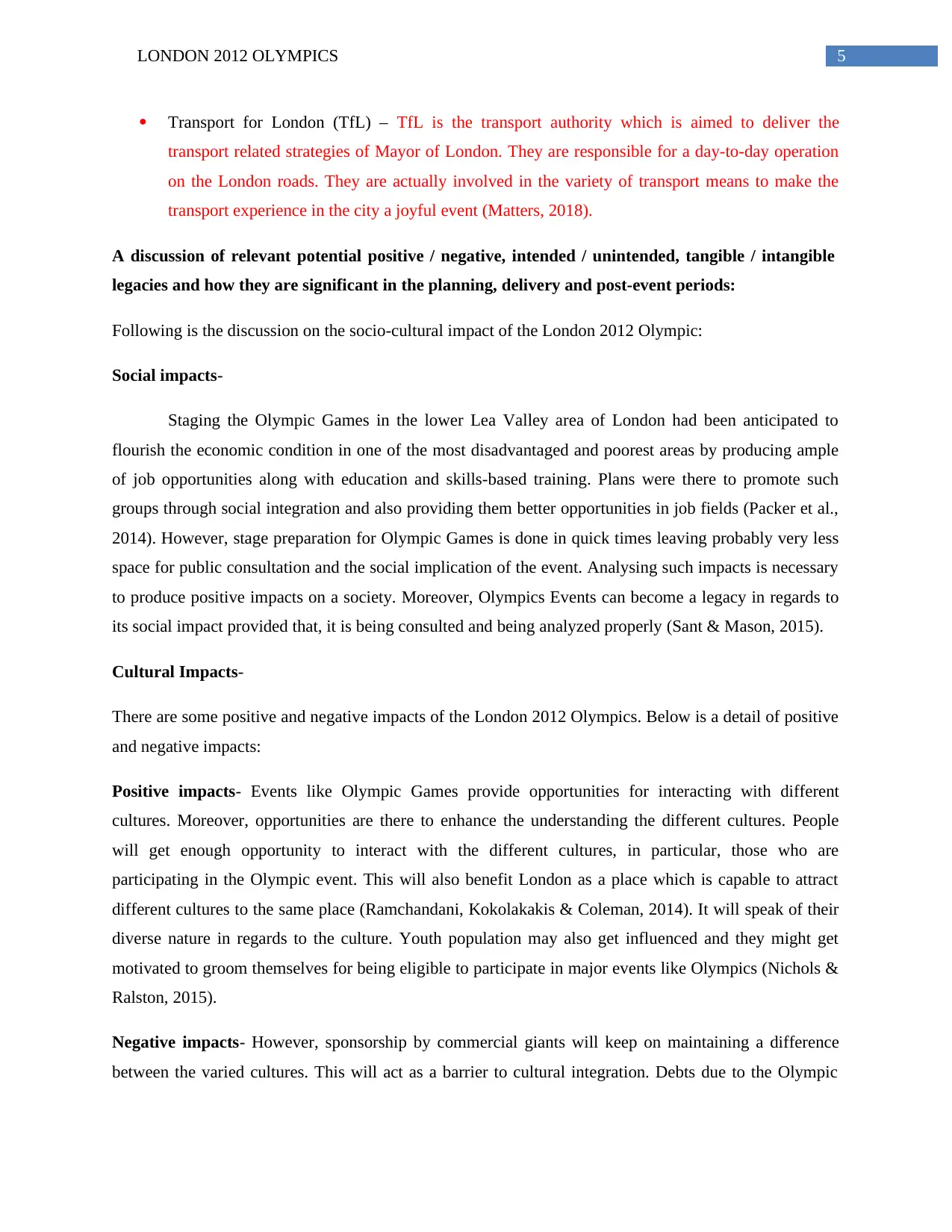
5LONDON 2012 OLYMPICS
Transport for London (TfL) – TfL is the transport authority which is aimed to deliver the
transport related strategies of Mayor of London. They are responsible for a day-to-day operation
on the London roads. They are actually involved in the variety of transport means to make the
transport experience in the city a joyful event (Matters, 2018).
A discussion of relevant potential positive / negative, intended / unintended, tangible / intangible
legacies and how they are significant in the planning, delivery and post-event periods:
Following is the discussion on the socio-cultural impact of the London 2012 Olympic:
Social impacts-
Staging the Olympic Games in the lower Lea Valley area of London had been anticipated to
flourish the economic condition in one of the most disadvantaged and poorest areas by producing ample
of job opportunities along with education and skills-based training. Plans were there to promote such
groups through social integration and also providing them better opportunities in job fields (Packer et al.,
2014). However, stage preparation for Olympic Games is done in quick times leaving probably very less
space for public consultation and the social implication of the event. Analysing such impacts is necessary
to produce positive impacts on a society. Moreover, Olympics Events can become a legacy in regards to
its social impact provided that, it is being consulted and being analyzed properly (Sant & Mason, 2015).
Cultural Impacts-
There are some positive and negative impacts of the London 2012 Olympics. Below is a detail of positive
and negative impacts:
Positive impacts- Events like Olympic Games provide opportunities for interacting with different
cultures. Moreover, opportunities are there to enhance the understanding the different cultures. People
will get enough opportunity to interact with the different cultures, in particular, those who are
participating in the Olympic event. This will also benefit London as a place which is capable to attract
different cultures to the same place (Ramchandani, Kokolakakis & Coleman, 2014). It will speak of their
diverse nature in regards to the culture. Youth population may also get influenced and they might get
motivated to groom themselves for being eligible to participate in major events like Olympics (Nichols &
Ralston, 2015).
Negative impacts- However, sponsorship by commercial giants will keep on maintaining a difference
between the varied cultures. This will act as a barrier to cultural integration. Debts due to the Olympic
Transport for London (TfL) – TfL is the transport authority which is aimed to deliver the
transport related strategies of Mayor of London. They are responsible for a day-to-day operation
on the London roads. They are actually involved in the variety of transport means to make the
transport experience in the city a joyful event (Matters, 2018).
A discussion of relevant potential positive / negative, intended / unintended, tangible / intangible
legacies and how they are significant in the planning, delivery and post-event periods:
Following is the discussion on the socio-cultural impact of the London 2012 Olympic:
Social impacts-
Staging the Olympic Games in the lower Lea Valley area of London had been anticipated to
flourish the economic condition in one of the most disadvantaged and poorest areas by producing ample
of job opportunities along with education and skills-based training. Plans were there to promote such
groups through social integration and also providing them better opportunities in job fields (Packer et al.,
2014). However, stage preparation for Olympic Games is done in quick times leaving probably very less
space for public consultation and the social implication of the event. Analysing such impacts is necessary
to produce positive impacts on a society. Moreover, Olympics Events can become a legacy in regards to
its social impact provided that, it is being consulted and being analyzed properly (Sant & Mason, 2015).
Cultural Impacts-
There are some positive and negative impacts of the London 2012 Olympics. Below is a detail of positive
and negative impacts:
Positive impacts- Events like Olympic Games provide opportunities for interacting with different
cultures. Moreover, opportunities are there to enhance the understanding the different cultures. People
will get enough opportunity to interact with the different cultures, in particular, those who are
participating in the Olympic event. This will also benefit London as a place which is capable to attract
different cultures to the same place (Ramchandani, Kokolakakis & Coleman, 2014). It will speak of their
diverse nature in regards to the culture. Youth population may also get influenced and they might get
motivated to groom themselves for being eligible to participate in major events like Olympics (Nichols &
Ralston, 2015).
Negative impacts- However, sponsorship by commercial giants will keep on maintaining a difference
between the varied cultures. This will act as a barrier to cultural integration. Debts due to the Olympic
⊘ This is a preview!⊘
Do you want full access?
Subscribe today to unlock all pages.

Trusted by 1+ million students worldwide
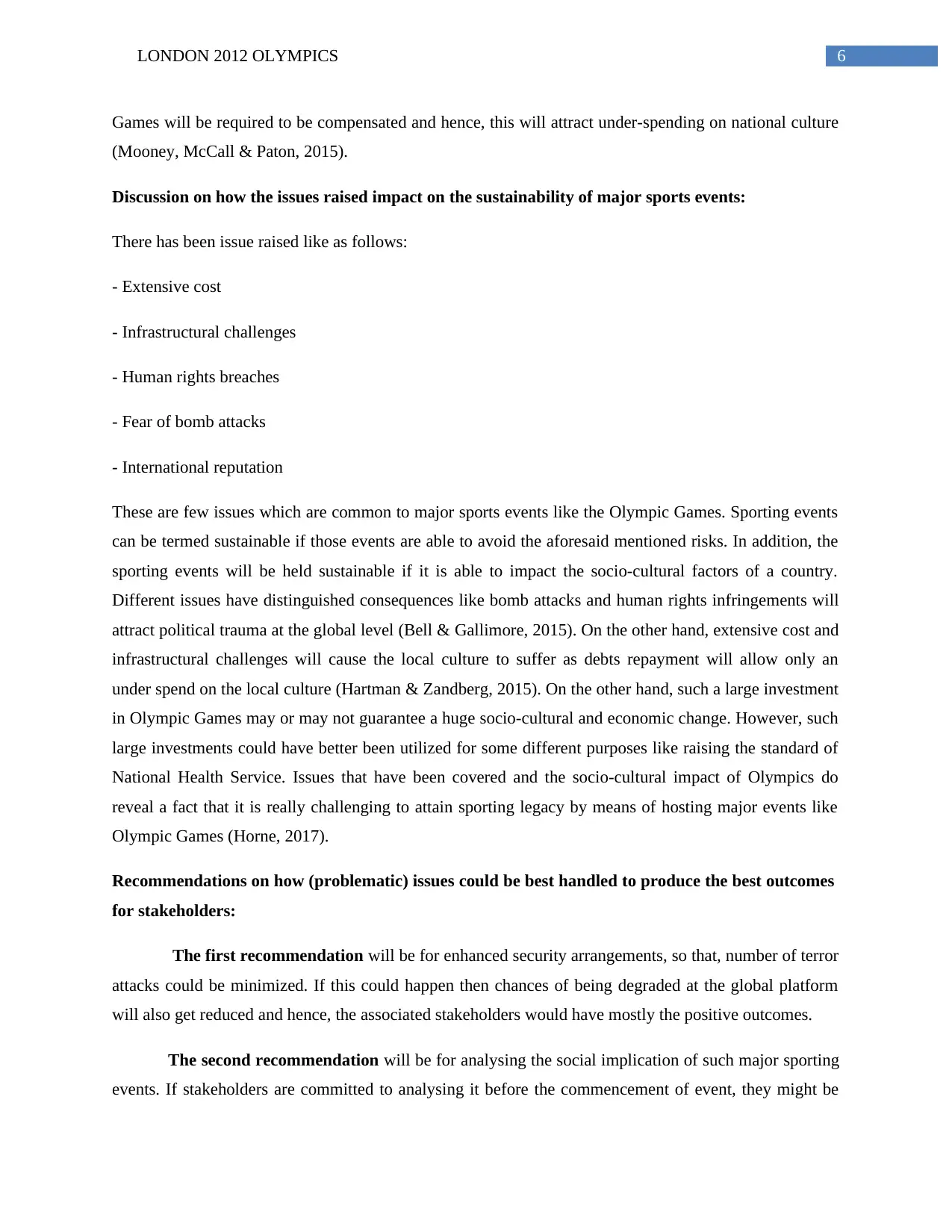
6LONDON 2012 OLYMPICS
Games will be required to be compensated and hence, this will attract under-spending on national culture
(Mooney, McCall & Paton, 2015).
Discussion on how the issues raised impact on the sustainability of major sports events:
There has been issue raised like as follows:
- Extensive cost
- Infrastructural challenges
- Human rights breaches
- Fear of bomb attacks
- International reputation
These are few issues which are common to major sports events like the Olympic Games. Sporting events
can be termed sustainable if those events are able to avoid the aforesaid mentioned risks. In addition, the
sporting events will be held sustainable if it is able to impact the socio-cultural factors of a country.
Different issues have distinguished consequences like bomb attacks and human rights infringements will
attract political trauma at the global level (Bell & Gallimore, 2015). On the other hand, extensive cost and
infrastructural challenges will cause the local culture to suffer as debts repayment will allow only an
under spend on the local culture (Hartman & Zandberg, 2015). On the other hand, such a large investment
in Olympic Games may or may not guarantee a huge socio-cultural and economic change. However, such
large investments could have better been utilized for some different purposes like raising the standard of
National Health Service. Issues that have been covered and the socio-cultural impact of Olympics do
reveal a fact that it is really challenging to attain sporting legacy by means of hosting major events like
Olympic Games (Horne, 2017).
Recommendations on how (problematic) issues could be best handled to produce the best outcomes
for stakeholders:
The first recommendation will be for enhanced security arrangements, so that, number of terror
attacks could be minimized. If this could happen then chances of being degraded at the global platform
will also get reduced and hence, the associated stakeholders would have mostly the positive outcomes.
The second recommendation will be for analysing the social implication of such major sporting
events. If stakeholders are committed to analysing it before the commencement of event, they might be
Games will be required to be compensated and hence, this will attract under-spending on national culture
(Mooney, McCall & Paton, 2015).
Discussion on how the issues raised impact on the sustainability of major sports events:
There has been issue raised like as follows:
- Extensive cost
- Infrastructural challenges
- Human rights breaches
- Fear of bomb attacks
- International reputation
These are few issues which are common to major sports events like the Olympic Games. Sporting events
can be termed sustainable if those events are able to avoid the aforesaid mentioned risks. In addition, the
sporting events will be held sustainable if it is able to impact the socio-cultural factors of a country.
Different issues have distinguished consequences like bomb attacks and human rights infringements will
attract political trauma at the global level (Bell & Gallimore, 2015). On the other hand, extensive cost and
infrastructural challenges will cause the local culture to suffer as debts repayment will allow only an
under spend on the local culture (Hartman & Zandberg, 2015). On the other hand, such a large investment
in Olympic Games may or may not guarantee a huge socio-cultural and economic change. However, such
large investments could have better been utilized for some different purposes like raising the standard of
National Health Service. Issues that have been covered and the socio-cultural impact of Olympics do
reveal a fact that it is really challenging to attain sporting legacy by means of hosting major events like
Olympic Games (Horne, 2017).
Recommendations on how (problematic) issues could be best handled to produce the best outcomes
for stakeholders:
The first recommendation will be for enhanced security arrangements, so that, number of terror
attacks could be minimized. If this could happen then chances of being degraded at the global platform
will also get reduced and hence, the associated stakeholders would have mostly the positive outcomes.
The second recommendation will be for analysing the social implication of such major sporting
events. If stakeholders are committed to analysing it before the commencement of event, they might be
Paraphrase This Document
Need a fresh take? Get an instant paraphrase of this document with our AI Paraphraser
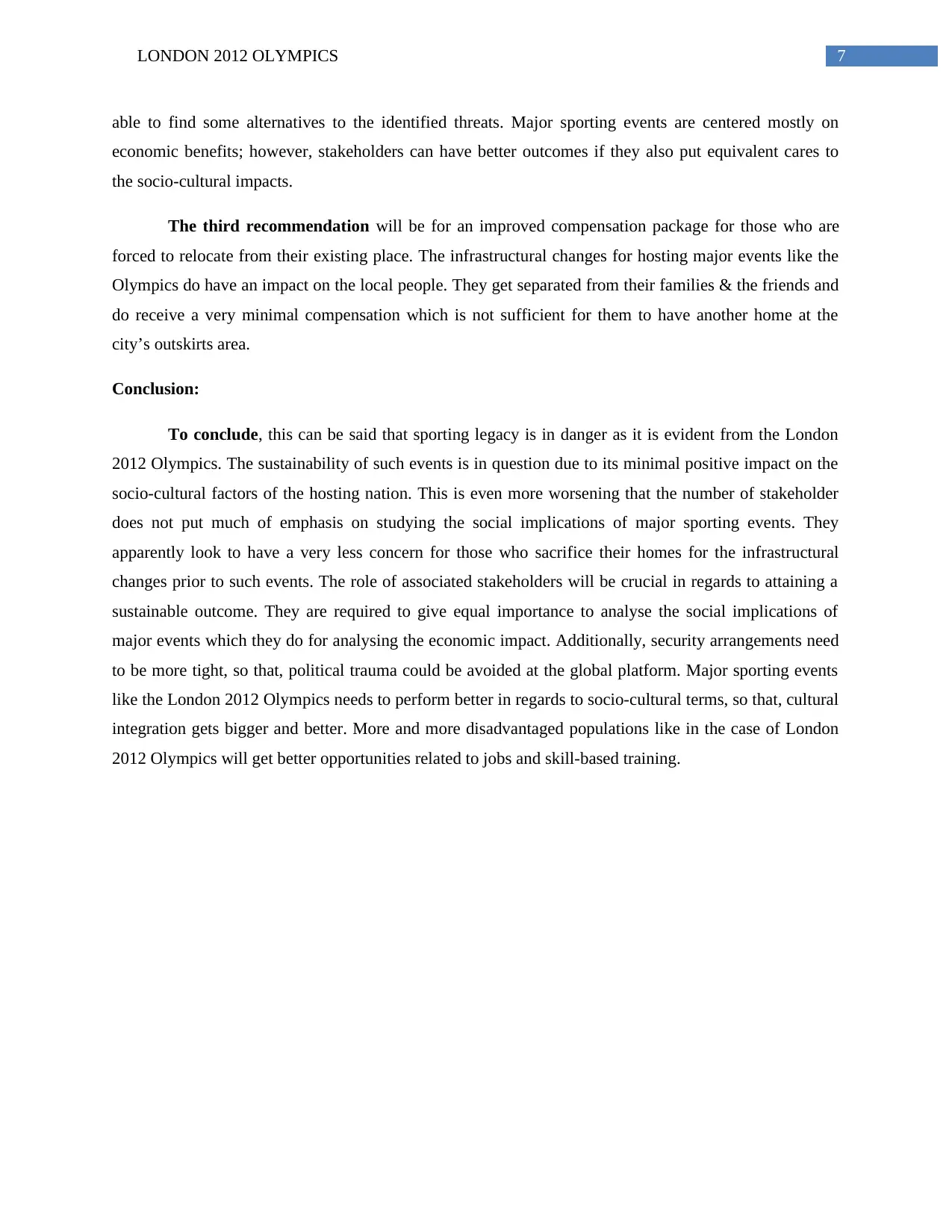
7LONDON 2012 OLYMPICS
able to find some alternatives to the identified threats. Major sporting events are centered mostly on
economic benefits; however, stakeholders can have better outcomes if they also put equivalent cares to
the socio-cultural impacts.
The third recommendation will be for an improved compensation package for those who are
forced to relocate from their existing place. The infrastructural changes for hosting major events like the
Olympics do have an impact on the local people. They get separated from their families & the friends and
do receive a very minimal compensation which is not sufficient for them to have another home at the
city’s outskirts area.
Conclusion:
To conclude, this can be said that sporting legacy is in danger as it is evident from the London
2012 Olympics. The sustainability of such events is in question due to its minimal positive impact on the
socio-cultural factors of the hosting nation. This is even more worsening that the number of stakeholder
does not put much of emphasis on studying the social implications of major sporting events. They
apparently look to have a very less concern for those who sacrifice their homes for the infrastructural
changes prior to such events. The role of associated stakeholders will be crucial in regards to attaining a
sustainable outcome. They are required to give equal importance to analyse the social implications of
major events which they do for analysing the economic impact. Additionally, security arrangements need
to be more tight, so that, political trauma could be avoided at the global platform. Major sporting events
like the London 2012 Olympics needs to perform better in regards to socio-cultural terms, so that, cultural
integration gets bigger and better. More and more disadvantaged populations like in the case of London
2012 Olympics will get better opportunities related to jobs and skill-based training.
able to find some alternatives to the identified threats. Major sporting events are centered mostly on
economic benefits; however, stakeholders can have better outcomes if they also put equivalent cares to
the socio-cultural impacts.
The third recommendation will be for an improved compensation package for those who are
forced to relocate from their existing place. The infrastructural changes for hosting major events like the
Olympics do have an impact on the local people. They get separated from their families & the friends and
do receive a very minimal compensation which is not sufficient for them to have another home at the
city’s outskirts area.
Conclusion:
To conclude, this can be said that sporting legacy is in danger as it is evident from the London
2012 Olympics. The sustainability of such events is in question due to its minimal positive impact on the
socio-cultural factors of the hosting nation. This is even more worsening that the number of stakeholder
does not put much of emphasis on studying the social implications of major sporting events. They
apparently look to have a very less concern for those who sacrifice their homes for the infrastructural
changes prior to such events. The role of associated stakeholders will be crucial in regards to attaining a
sustainable outcome. They are required to give equal importance to analyse the social implications of
major events which they do for analysing the economic impact. Additionally, security arrangements need
to be more tight, so that, political trauma could be avoided at the global platform. Major sporting events
like the London 2012 Olympics needs to perform better in regards to socio-cultural terms, so that, cultural
integration gets bigger and better. More and more disadvantaged populations like in the case of London
2012 Olympics will get better opportunities related to jobs and skill-based training.
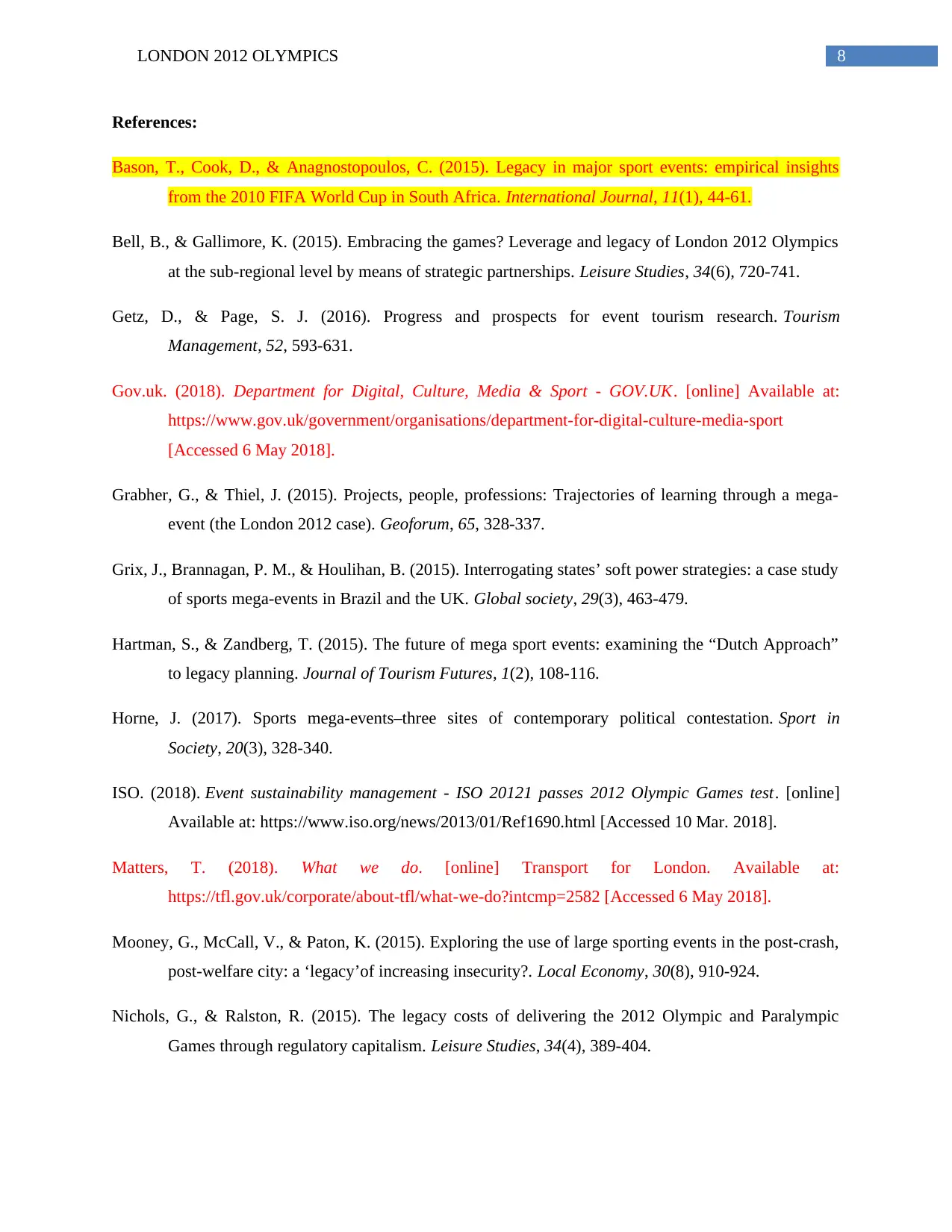
8LONDON 2012 OLYMPICS
References:
Bason, T., Cook, D., & Anagnostopoulos, C. (2015). Legacy in major sport events: empirical insights
from the 2010 FIFA World Cup in South Africa. International Journal, 11(1), 44-61.
Bell, B., & Gallimore, K. (2015). Embracing the games? Leverage and legacy of London 2012 Olympics
at the sub-regional level by means of strategic partnerships. Leisure Studies, 34(6), 720-741.
Getz, D., & Page, S. J. (2016). Progress and prospects for event tourism research. Tourism
Management, 52, 593-631.
Gov.uk. (2018). Department for Digital, Culture, Media & Sport - GOV.UK. [online] Available at:
https://www.gov.uk/government/organisations/department-for-digital-culture-media-sport
[Accessed 6 May 2018].
Grabher, G., & Thiel, J. (2015). Projects, people, professions: Trajectories of learning through a mega-
event (the London 2012 case). Geoforum, 65, 328-337.
Grix, J., Brannagan, P. M., & Houlihan, B. (2015). Interrogating states’ soft power strategies: a case study
of sports mega-events in Brazil and the UK. Global society, 29(3), 463-479.
Hartman, S., & Zandberg, T. (2015). The future of mega sport events: examining the “Dutch Approach”
to legacy planning. Journal of Tourism Futures, 1(2), 108-116.
Horne, J. (2017). Sports mega-events–three sites of contemporary political contestation. Sport in
Society, 20(3), 328-340.
ISO. (2018). Event sustainability management - ISO 20121 passes 2012 Olympic Games test. [online]
Available at: https://www.iso.org/news/2013/01/Ref1690.html [Accessed 10 Mar. 2018].
Matters, T. (2018). What we do. [online] Transport for London. Available at:
https://tfl.gov.uk/corporate/about-tfl/what-we-do?intcmp=2582 [Accessed 6 May 2018].
Mooney, G., McCall, V., & Paton, K. (2015). Exploring the use of large sporting events in the post-crash,
post-welfare city: a ‘legacy’of increasing insecurity?. Local Economy, 30(8), 910-924.
Nichols, G., & Ralston, R. (2015). The legacy costs of delivering the 2012 Olympic and Paralympic
Games through regulatory capitalism. Leisure Studies, 34(4), 389-404.
References:
Bason, T., Cook, D., & Anagnostopoulos, C. (2015). Legacy in major sport events: empirical insights
from the 2010 FIFA World Cup in South Africa. International Journal, 11(1), 44-61.
Bell, B., & Gallimore, K. (2015). Embracing the games? Leverage and legacy of London 2012 Olympics
at the sub-regional level by means of strategic partnerships. Leisure Studies, 34(6), 720-741.
Getz, D., & Page, S. J. (2016). Progress and prospects for event tourism research. Tourism
Management, 52, 593-631.
Gov.uk. (2018). Department for Digital, Culture, Media & Sport - GOV.UK. [online] Available at:
https://www.gov.uk/government/organisations/department-for-digital-culture-media-sport
[Accessed 6 May 2018].
Grabher, G., & Thiel, J. (2015). Projects, people, professions: Trajectories of learning through a mega-
event (the London 2012 case). Geoforum, 65, 328-337.
Grix, J., Brannagan, P. M., & Houlihan, B. (2015). Interrogating states’ soft power strategies: a case study
of sports mega-events in Brazil and the UK. Global society, 29(3), 463-479.
Hartman, S., & Zandberg, T. (2015). The future of mega sport events: examining the “Dutch Approach”
to legacy planning. Journal of Tourism Futures, 1(2), 108-116.
Horne, J. (2017). Sports mega-events–three sites of contemporary political contestation. Sport in
Society, 20(3), 328-340.
ISO. (2018). Event sustainability management - ISO 20121 passes 2012 Olympic Games test. [online]
Available at: https://www.iso.org/news/2013/01/Ref1690.html [Accessed 10 Mar. 2018].
Matters, T. (2018). What we do. [online] Transport for London. Available at:
https://tfl.gov.uk/corporate/about-tfl/what-we-do?intcmp=2582 [Accessed 6 May 2018].
Mooney, G., McCall, V., & Paton, K. (2015). Exploring the use of large sporting events in the post-crash,
post-welfare city: a ‘legacy’of increasing insecurity?. Local Economy, 30(8), 910-924.
Nichols, G., & Ralston, R. (2015). The legacy costs of delivering the 2012 Olympic and Paralympic
Games through regulatory capitalism. Leisure Studies, 34(4), 389-404.
⊘ This is a preview!⊘
Do you want full access?
Subscribe today to unlock all pages.

Trusted by 1+ million students worldwide
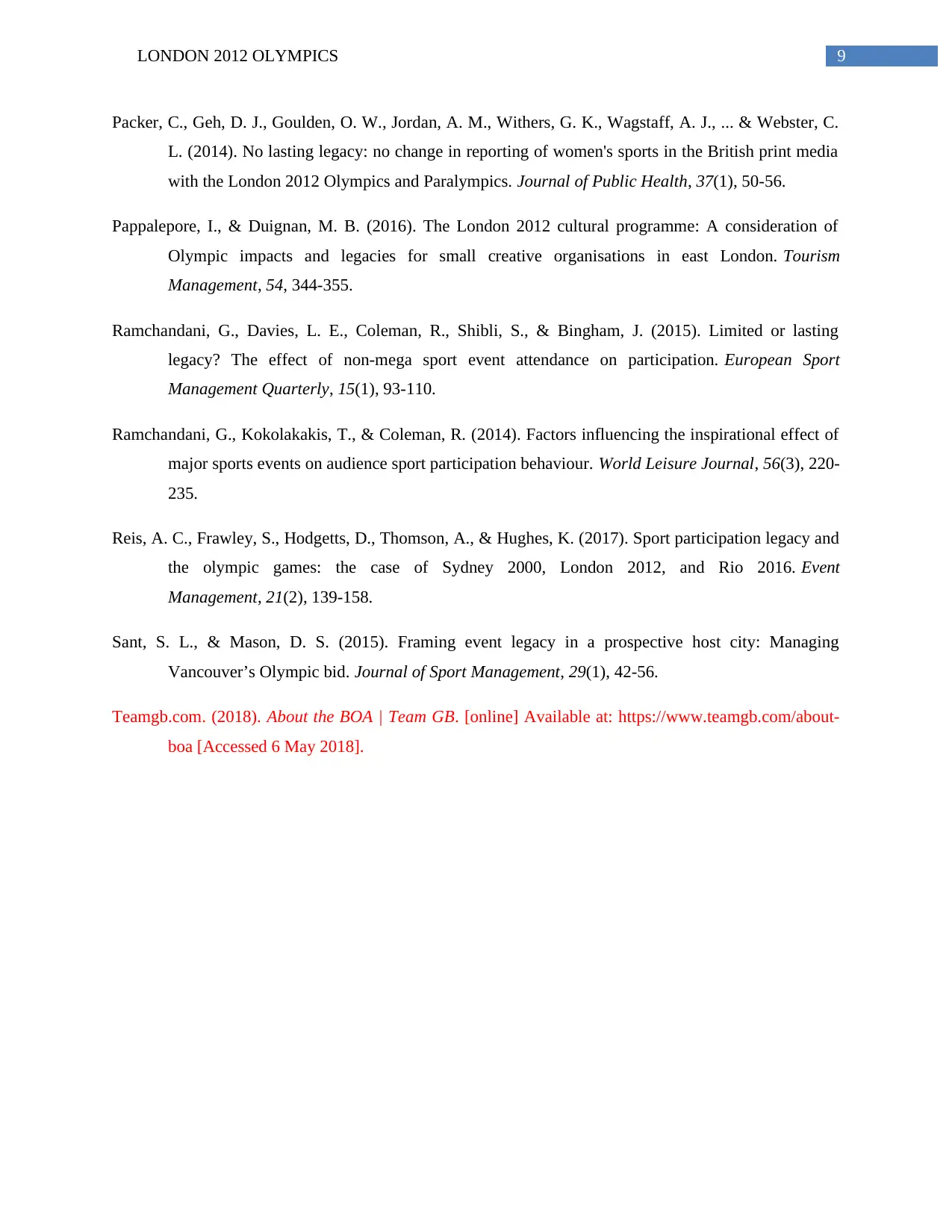
9LONDON 2012 OLYMPICS
Packer, C., Geh, D. J., Goulden, O. W., Jordan, A. M., Withers, G. K., Wagstaff, A. J., ... & Webster, C.
L. (2014). No lasting legacy: no change in reporting of women's sports in the British print media
with the London 2012 Olympics and Paralympics. Journal of Public Health, 37(1), 50-56.
Pappalepore, I., & Duignan, M. B. (2016). The London 2012 cultural programme: A consideration of
Olympic impacts and legacies for small creative organisations in east London. Tourism
Management, 54, 344-355.
Ramchandani, G., Davies, L. E., Coleman, R., Shibli, S., & Bingham, J. (2015). Limited or lasting
legacy? The effect of non-mega sport event attendance on participation. European Sport
Management Quarterly, 15(1), 93-110.
Ramchandani, G., Kokolakakis, T., & Coleman, R. (2014). Factors influencing the inspirational effect of
major sports events on audience sport participation behaviour. World Leisure Journal, 56(3), 220-
235.
Reis, A. C., Frawley, S., Hodgetts, D., Thomson, A., & Hughes, K. (2017). Sport participation legacy and
the olympic games: the case of Sydney 2000, London 2012, and Rio 2016. Event
Management, 21(2), 139-158.
Sant, S. L., & Mason, D. S. (2015). Framing event legacy in a prospective host city: Managing
Vancouver’s Olympic bid. Journal of Sport Management, 29(1), 42-56.
Teamgb.com. (2018). About the BOA | Team GB. [online] Available at: https://www.teamgb.com/about-
boa [Accessed 6 May 2018].
Packer, C., Geh, D. J., Goulden, O. W., Jordan, A. M., Withers, G. K., Wagstaff, A. J., ... & Webster, C.
L. (2014). No lasting legacy: no change in reporting of women's sports in the British print media
with the London 2012 Olympics and Paralympics. Journal of Public Health, 37(1), 50-56.
Pappalepore, I., & Duignan, M. B. (2016). The London 2012 cultural programme: A consideration of
Olympic impacts and legacies for small creative organisations in east London. Tourism
Management, 54, 344-355.
Ramchandani, G., Davies, L. E., Coleman, R., Shibli, S., & Bingham, J. (2015). Limited or lasting
legacy? The effect of non-mega sport event attendance on participation. European Sport
Management Quarterly, 15(1), 93-110.
Ramchandani, G., Kokolakakis, T., & Coleman, R. (2014). Factors influencing the inspirational effect of
major sports events on audience sport participation behaviour. World Leisure Journal, 56(3), 220-
235.
Reis, A. C., Frawley, S., Hodgetts, D., Thomson, A., & Hughes, K. (2017). Sport participation legacy and
the olympic games: the case of Sydney 2000, London 2012, and Rio 2016. Event
Management, 21(2), 139-158.
Sant, S. L., & Mason, D. S. (2015). Framing event legacy in a prospective host city: Managing
Vancouver’s Olympic bid. Journal of Sport Management, 29(1), 42-56.
Teamgb.com. (2018). About the BOA | Team GB. [online] Available at: https://www.teamgb.com/about-
boa [Accessed 6 May 2018].
1 out of 10
Related Documents
Your All-in-One AI-Powered Toolkit for Academic Success.
+13062052269
info@desklib.com
Available 24*7 on WhatsApp / Email
![[object Object]](/_next/static/media/star-bottom.7253800d.svg)
Unlock your academic potential
Copyright © 2020–2026 A2Z Services. All Rights Reserved. Developed and managed by ZUCOL.





